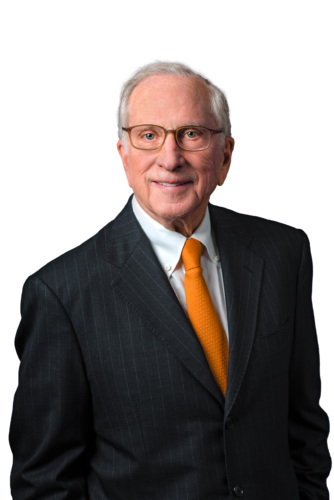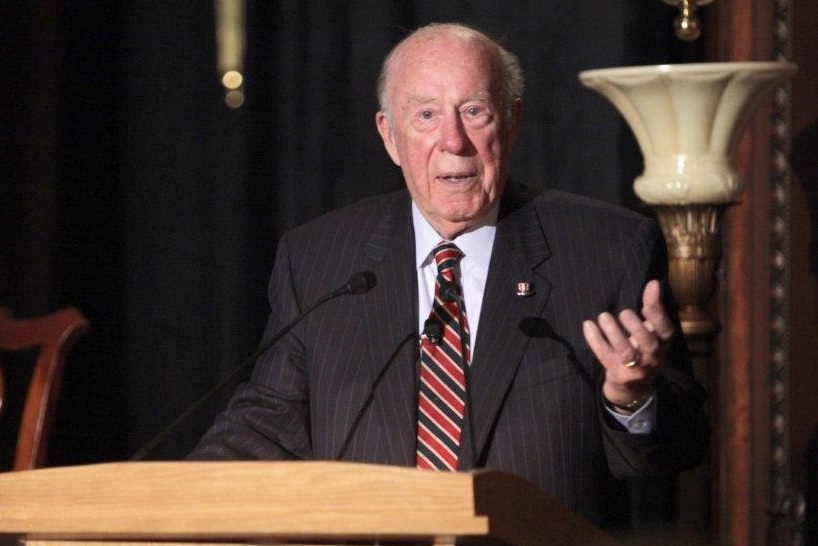
Sam Nunn
Co-Founder and Co-Chair, NTI
In January, George and I spoke about the growing nuclear dangers challenging the world.
George was, as usual, focused on actions – what states could do to reduce nuclear risks. His leadership and determination on that day was strong and compelling.
Two weeks later, George left us, but not in spirit or influence. Henry Kissinger, Bill Perry and I completed an op-ed based on the ideas that we had each discussed with George. We were propelled forward by the trust among us that our friend had inspired, by his calm but intrepid commitment, and by our deep desire to pay tribute to this giant of a man who profoundly influenced our thinking.
George had a deep love of country, and above all, integrity, decency, and respect for others at home and abroad. George was also a heck of a lot of fun. He cherished his family – his children, grandchildren and great-grandchildren meant the world to him.
Charlotte was a full partner in his work and in his life. She has an uncanny understanding about diplomacy and how to bring people together to see their common interests. Charlotte is the one person in the universe who could make meetings with Russians, Europeans, and Chinese to discuss the risk of nuclear or biological catastrophe entertaining, productive and fun. Who else but Charlotte could arrange a dinner with a Russian delegation in the National Archives with all the tables facing the historic Magna Carta?
George had a significant influence and an enduring role in saving the world from nuclear catastrophe. He learned early in his life about the power, the peril and the complexity of nuclear weapons.
In August 1945, as a young Marine Captain, George was on a troop ship headed across the Pacific to take part in the invasion of Japan. He knew how hard the Japanese would fight to protect their homeland. He knew that he and his fellow Marines would suffer enormous losses. On the way to this major battle, George learned that the Japanese had surrendered. George knew then – and never forgot – that nuclear weapons had accelerated the end of a war which could have ended his life. He also never forgot the devastation of Hiroshima and Nagasaki.
Fast forward to the 1980s – the height of the Cold War – a time when the United States and the Soviet Union had amassed enough nuclear and chemical weapons to destroy the earth many times over.
As President Reagan’s Secretary of State, George anticipated the historic opportunity presented by a different type of leader in Moscow – Mikhail Gorbachev.
Through creative and tenacious diplomacy, he led negotiations for a treaty eliminating an entire class of weapons and laid the foundation for historic cuts in strategic nuclear arms.
George encouraged and supported Presidents Reagan and Gorbachev in their joint declaration that helped bring the Cold War to an end: “A nuclear war cannot be won and must never be fought.”
George sought advice, he listened, he heard, he explained, and he acted.
George looked around corners and read trends. He anticipated and created opportunities. Like Churchill, when the facts changed, he was not afraid to change his mind.
Ahead of almost everyone, he understood that with the end of the Cold War, the danger of a world-ending nuclear exchange had receded, but that new nuclear dangers were increasing. He saw the grave dangers of continued reliance on mutual assured destruction with a growing number of nuclear weapons states and the emergence of new technologies like cyber, false warnings, mistakes and blunders.
In 2006, Bill Perry and Sid Drell joined George in convening a Stanford conference to revisit the Reagan–Gorbachev Reykjavik Summit and bring the lessons from that time forward to address new nuclear perils.
This conference led to what author Philip Taubman described in his 2012 book as “The Partnership” – as well as a series of Wall Street Journal op-eds co-authored by George, Bill, Henry and me. Together we wrote: “U.S. leadership will be required to take the world to the next stage – to a solid consensus for reversing reliance on nuclear weapons globally as a vital contribution to preventing their proliferation into dangerous hands, and ultimately ending them as a threat to the world.”
Bishop Swing, you have often reminded us that, at the end of time, the author of life will return to this created and loved Earth and demand accountability for what we did to enhance or destroy it.
Until the very end of his life, George Shultz gave us his best in protecting God’s creation for generations to come. No one could have done it better.
###
Sign up for our newsletter to get the latest on nuclear and biological threats.
The nuclear nonproliferation regime is a broad international framework of agreements and organizations aimed at preventing the spread of nuclear weapons and contributing to arms control and disarmament progress.
France's nuclear, biological, chemical, and missile overviews.
Full overview of Turkey's nuclear, chemical, biological, and missile capabilities and nonproliferation activities.
